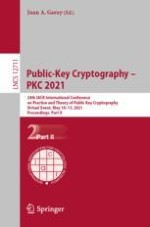2021 | OriginalPaper | Buchkapitel
Multiparty Cardinality Testing for Threshold Private Intersection
verfasst von : Pedro Branco, Nico Döttling, Sihang Pu
Erschienen in: Public-Key Cryptography – PKC 2021
Aktivieren Sie unsere intelligente Suche, um passende Fachinhalte oder Patente zu finden.
Wählen Sie Textabschnitte aus um mit Künstlicher Intelligenz passenden Patente zu finden. powered by
Markieren Sie Textabschnitte, um KI-gestützt weitere passende Inhalte zu finden. powered by


